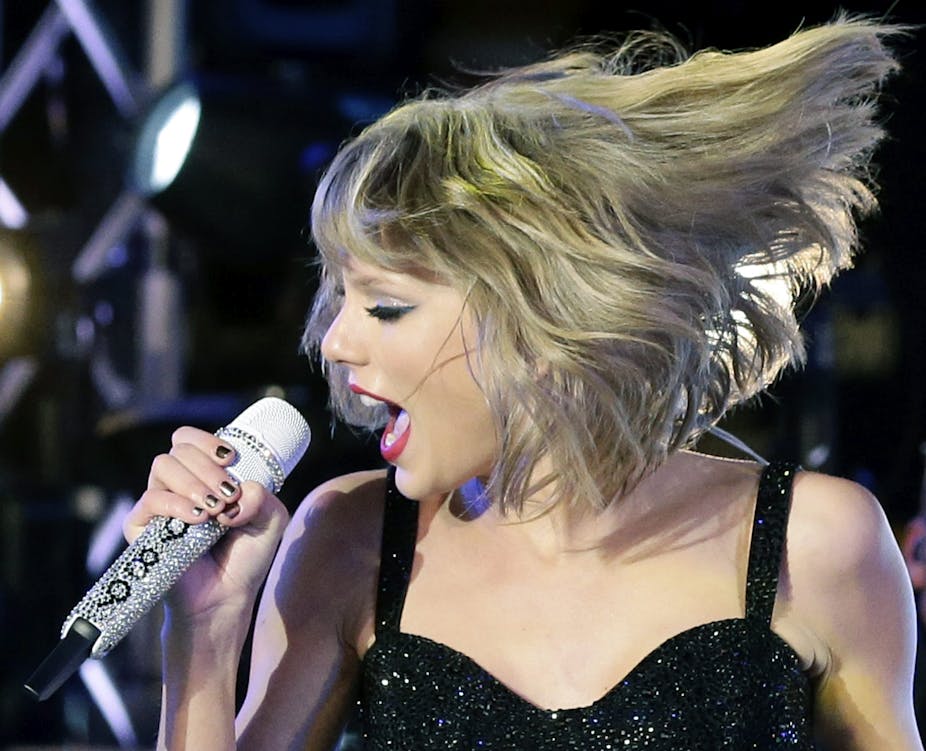This Monday on the Australia Day public holiday, Triple J’s annual Hottest 100 for 2014 will be announced live across the afternoon and evening. While the countdown is usually the ABC radio station’s highest profile event - and the annual list has been held continuously since 1993 – this year controversy has erupted over who could and should be selected for the poll.
What seems like a storm in a teacup was kicked into existence thanks to a viral BuzzFeed meme created by journalist Mark Di Stefano on January 13. He asked on Twitter, “Why Isn’t Everyone Voting For "Shake It Off” In The Hottest 100?“
Tongue-in-cheek, Di Stefano was referring to the absence of American pop singer Taylor Swift’s up-beat top-selling single that spent three weeks at number one on the ARIA charts in September 2014.
The original version of the popular song hadn’t been played on Triple J playlists at all, but there is a loophole that can undermine the station’s official selection choices: online voters for the poll are able to select songs from beyond the pre-selected choices if they so choose to.
The home-grown devil’s advocate viral campaign has become serious through social media forums: the odds are closing in, and provided that the artist is not disqualified due to promotional tie-ins, there is a good chance that Taylor Swift will even find a prominent place in the charts.
Could the single even win? We’ll find out on Monday.
Making sense of #Tay4Hottest100
Media op-eds about #tay4hottest100 have collectively provided enough focus points for an entire "Intro to Cultural Studies” subject.
Excellent points have been made about gender bias in pop music, problems of national identity and overt nationalism, fandom, the commodification of youth culture, corporate versus independent culture industries, high and low culture (the “hipster” backlash, rock versus pop tastes), and authenticity versus inauthenticity in pop music.
There are calls that the station needs to rethink its coverage of female talent, suggesting an over-emphasis on male bands at the expense of talented solo pop divas. Overall, the two main media narratives of the engineered “controversy” fall into the following two patterns.
Firstly, that Swift is the enemy usurper, musically invading the rightful place of the local heroes (favourites to win, Australian electronic duo Peking Duck, who seem to stand for Australian music in general). In this scenario, the call is for Swift to be “ejected” from the competition.
Secondly, we hear that Swift is the hero of the day, a useful icon inadvertently helping to highlight the flaws of the radio station, whether this is due to a poor representation of female artists or else showcasing the station’s inadequate understanding of what the youth demographic “really wants”.
Undeniably, the “Shake It Off” for Hottest 100 campaign has provided excellent free publicity for the national youth broadcaster, and so at this point there are certainly no losers out of the two constructed sides. The controversy has led to healthy mainstream interest in the Hottest 100, which even coincides nicely with the station’s 40th anniversary celebrations.
So, is there even a problem with this whole thing?
Yet it is clear what is at stake for Triple J in this event: the potential undermining of one of the station’s key fundraisers, which if it was to recur each year might seriously jeopardise the sustained interest of its regular fan base and audience. If the radio station was to adopt a more blatantly “commercial” playlist (i.e. if it only played ARIA chart toppers), then it would lose its unique differentiation point in the Australian broadcasting market.
So, #tay4hottest100 is OK this year as a media joke, but I’m sure that the station is hoping that there are no repeats in future.
Making sense of Taylor Swift
Sean Redmond in his new book Celebrity and The Media suggests that a celebrity such as Taylor Swift is a “person whose name, image, lifestyle and opinions carry cultural and economic worth, and who are first and foremost idealised popular media constructions”.
The cultural and economic meanings attached to the celebrity-sign of “Taylor Swift” seems antithetical to Triple J’s self-representation as a place for exciting new music, with a supposed focus on emerging Australian talent. This perhaps explains why Swift is excluded from the playlist when other “mainstream” American artists and chart toppers (such as her famous detractor Kanye West) are still played on the station heavily: the alignment and transfer of values of what is considered “cool” and “hip” between the station and its chosen artists.
Adding to this, Swift emerged from the American country music background, which is probably the least played musical genre on the station: whereas Kanye’s hip-hop easily passes the station’s acceptable music genre test.
So to use a bad pun, the playlist at Triple J may not be “Taylored”, but it is highly tailored to cultivate a particular musical sensibility and taste. The concept of “youth” seems to be used in reference to a musical market and to identify particular music genres rather than being a real or an accurate signifier of young tastes and interests.
It raises the question: what responsibility does a national youth broadcaster have in the shaping and the adapting of young musical interests? This storm-in-a-teacup is actually providing an outlet for discussion of some big ideas about national musical tastes and values: thanks Swift fans.

